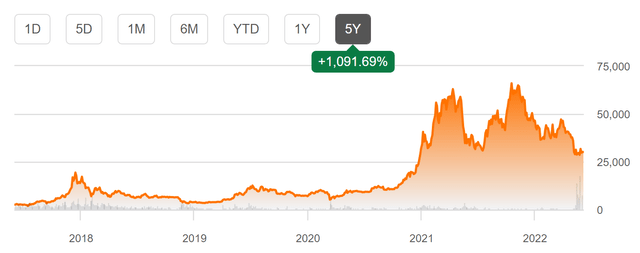Nature/iStock via Getty Images
Bitcoin (BTC-USD) was supposed to revolutionize the financial world and the way we use currency. Alongside other cryptocurrencies, it was promised as a more-secure, anonymized, efficient blockchain payment for the modern world. In reality, Bitcoin has failed to deliver on hardly any of its supposed goals/benefits, faces more competitors than ever, and lacks any intrinsic value to back up its worth.
Lacks Stability
Bitcoin’s price chart for the past five years shows massive fluctuations in price.
This level of price fluctuation is prohibitive to its use as a core currency in any economy. If you think inflation is bad, imagine the price swings that would occur if Bitcoin was used ubiquitously throughout our economy. Bitcoin being an untethered, unbacked, digital currency means it is traded as a purely speculative investment vehicle and changes based on sentiment alone rather than any fundamentals. As such, it cannot be stable enough to see real long-term adoption as a currency. And if it does, it will have to change so much as to no longer have any upside as an investment.
Anonymized and Untraceable? I don’t think so
Several high-profile seizures over the past few years have proven beyond a shadow of a doubt that Bitcoin is highly traceable thanks to its public ledgers. As a result, the IRS taxes crypto, and various governments have been seizing it with increasing frequency. This isn’t restricted to Bitcoin either, Ethereum (ETH-USD) and other cryptocurrencies have also been susceptible to seizures and asset freezes. One of the perceived benefits of Bitcoin, to many, was the possibility for people living under oppressive regimes to transfer currency and conduct trade without the purview of the state. However, as we have seen in Belarus recently, the ability to seize Bitcoin is very real. The truth is that Bitcoin’s claim to anonymity is fading by the day as agencies around the world learn to attribute transactions to individuals and continue to pour resources into their efforts to do so.
Unclear Regulatory Future
The regulatory environment for cryptocurrency is getting more uncertain as various countries make their bids to attract and also tax and control the industry. Calls for the regulation of crypto in the United States have strengthened in the aftermath of the TerraUSD crash (the company has since relaunched LUNA2-USD). Kevin O’Leary expects regulations to come after the November midterms and the US Congress has introduced fifty crypto-related bills this year.
In the United Kingdom, the opening of Parliament featured a promise to introduce legislation to grant the government “powers to more quickly and easily seize and recover crypto assets.” This would come alongside a regulatory framework (and possibly UK-govt. issued NFT) that is meant to facilitate the growth of the crypto sector in the UK.
With so much new regulation sitting on the horizon, there is a large unknown that could harm the sentiment surrounding Bitcoin.
A Plethora of Non-Crypto Alternatives for Digital Currency
The other problem I foresee for Bitcoin, and other cryptocurrencies, is that there are simply so many competitors out there with more usability. While Bitcoin may be adopted here and there by retailers (or the odd Honduras), other forms of digital cash are becoming available on a wider scale and used as easily as a credit card. Apple Cash, Venmo, and other services allow you to send and receive money with ease as well as spend on various services. Countries are also rolling out digital versions of their fiat currencies, such as the Digital Yuan in the People’s Republic of China. According to Seeking Alpha’s write-up on the Digital Yuan, it has numerous advantages while its two listed disadvantages (lack of anonymity and competition with Alibaba) are not meaningful when Bitcoin itself is already traceable and competition is inevitable.
Conclusion
Bitcoin has seen a lot of praise and hate since its inception but beneath all of the noise, the cryptocurrency doesn’t have a lot to offer. It is too unstable to serve as a real currency (plus you are taxed on its fluctuations). Its promise of anonymity has been proven false as governments pour money into tools that allow them to seize crypto. The regulatory environment is about to shift as countries get serious about regulating crypto. And finally, it simply does not have a unique benefit in most use cases: there are plenty of other ways to conduct digital transactions that are often easier and more efficient. In the end, Bitcoin is neither attractive as an investment nor a currency.






